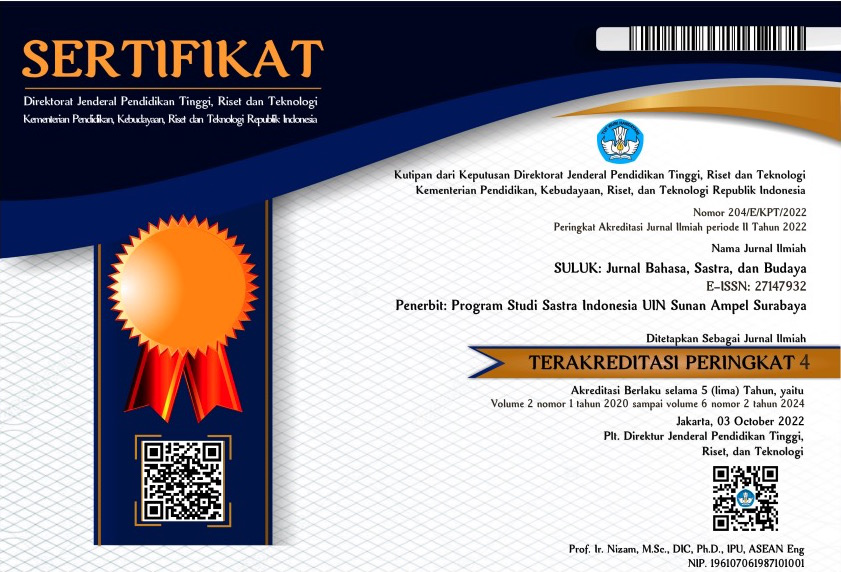Membidik Masa Depan Bahasa Di Era Society 5.0; Kajian Pemertahanan Bahasa
DOI:
https://doi.org/10.15642/suluk.2023.5.2.190-211Keywords:
Era Society 5.0, Slang, Language MaintenanceAbstract
The development of technology in the era of Society 5.0 has influenced social interactions and language changes. This research aims to describe the forms and functions of slang, as well as the importance of language maintenance that needs to be enhanced in the era of Society 5.0. The method used in this research is a qualitative descriptive method. This method describes language changes in terms of the formand function of slang, as well as the importance of language maintenance because of technological advancements in the era of Society 5.0. Data collection techniques were carried out through observation and note-taking. This method allows researchers to gain a deep understanding and insight that may not be visible through other approaches. Data was collected by observing language data used in digital platforms and then identifying them in the process of language formation and analysis of language functions.The results of this research include the existence of fifty slang words with the following formation processes: (1) phonemic structure reversal, (2) changes in the final syllable with -ay, (3) acronym, abbreviation, and phrase forms, (4) word reversal forms, and (5) words from regional languages. Data were analysed based on their functions as: (1) expressive, (2) directive, (3) informative, and (4) fative. As for research in the field of language maintenance resulting from technological changesand language usage, the required attitudes include: (1) language loyalty, (2) language pride, and (3) language norm awareness.
Downloads
References
Arifin, M. (2015). Mempertahankan Bahasa Indonesia sebagai Jati Diri Bangsa. Prosiding Seminar Nasional Bulan Bahasa UNIB.
Buehler, Karl . (1982). Sprachtheorie. Stuttgart: UTB
Chaer, Abdul dan Leonie Agustina. 2004. Sosiolinguistik Perkenalan Awal. Jakarta: Rineka Cipta.
Crystal, David (2000), Language Death, Cambridge: Cambridge University Press.
Daud, R. F. (2021). Dampak Perubahan Teknologi Terhadap Bahasa Indonesia. Jurnal Interaksi., 5, No. 2.
Daniel Cunliffe, Susan C. Herrings. 2007. Introduction to Minority Languages, Multimedia and The Web. Taylor & Francis. Vol. 11, No. 2: 131 137. https://doi.org/10.1080/13614560512331392186
Fishman, J. A. (1968). Readings in the Sociology of Language. The Hague.
Garvin, P. L. & M. M. (1968). No Title. The Urbaization of the Guarani Language. Problem in Language and Culture, Dalam Fisman J.A. (Ed) Reading in Tes Sosiology of Langage, Mounton, Paris The Hague.
Harayama. (2017). Society 5.0 Dan Riset Perguruan Tinggi Indonesia. Prosiding Seminar Nasional Berseri, 91-100. https://doi.org/10.22236/semnas/11120166%0Ahttps://doi.org/10.22236/semnas/1191-100171
Hendarsyah, D. (2019). ECommerce Di Era Industri 4.0 Dan Society 5.0. IQTISHADUNA: Jurnal Ilmiah Ekonomi Kita, 8(2), 171-184.
https://doi.org/10.46367/iqtishaduna.v8i2.170.
I Dewa Putu Wijana. 2018. Pemertahanan dan Pengembangan Bahasa Indonesia. Widyaparwa, Volume 46, Nomor 1, Juni 2018; 91-98.
Jakobson, Roman. (1961) 1971. Linguistics and Communication Theory. Dalam Jakobson. R. Selected Writings II. The Hague: Mouton.
Jendra, M. I. I. (2012). Sosiolinguistics the Study of Scienties Language. Yogyakarta: Graha Ilmu.
Kridalaksana, H. (2001). Pengembangan Ilmu Bahasa dan Pembinaan Bahasa. Flores: Nusa Indah.
Kridalaksana, Harimurti. (2004). Dari Fungsi Fatis ke Ungkapan Fatis. Dalam Sutami,
Hermina. 2004. Ungkapan Fatis dalam Pelbagai Bahasa. Pusat Leksikologi dan Leksikografi Publikasi no 4. Fakultas Ilmu Pengetahuan Budaya Universitas Indonesia.
Kusyani, D. (2022a). Pemertahanan Bahasa Indonesia Terhadap Pengaruh Bahasa Asing Pada Era Society 5.0. Pedagogi, 8, No.2, 134 142. https://doi.org/10.47662/pedagogi.v8i2.391
Mumtaha, H. A., & Khoiri, H. A. (2019). Analisis Dampak Perkembangan Revolusi Indu stri 4 . 0 dan Socie. IJurnal Ilmiah Ilmu Ilmu Teknik, 4, 55-60.
Muslich, M. 2020. (2020). Karakteristik Slang Remaja sebagai Kreativitas Berbahasa Indonesia pada Komentar Status Inside Lombok di Instagram. Jurnal Bastrindo, I No. 2, 201-213.
M. Mugni Assapri. 2014. Eksistensi Bahasa Indonesia Sebagai Bahasa Nasional dan Perkembangannya di Era Globalisasi. Prasi: vol. 9, No. 18: 29 37. https://doi.org/10.23887/prasi.v9i18.8943.
Nasiti F & Abdu A. (2020). Analisis Persepsi Civitas Akademika Terhadap Konsep Merdeka Belajar Menyongsong Era Industri 5.0. Jurnal Kependidikan: Jurnal Hasil Penelitian Dan Kajian Kepustakaan Di Bidang Pendidikan, Pengajaran Dan Pembelajaran, 6(3), 365. h ttps://doi.org/10.33394/jk.v6i3.2913.
Özdemir, V., & Hekim, N. (2018). Birth of industry 5.0: Making sense of big data with artificial intelligence, “the internet of things” and next generation technology policy. Omics: A Journal of Integrative Biology, 22(1), 65-76.
Rikidayanto, M. F. (2019). Korelasi Pengajaran Bahasa Indonesia di Era Revolusi Industri 4.0 dan Society 5.0. 440-447.
Sulastri, R. (2021). Penggunaan Slang dalam Platform digital Facebook di Kalangan Remaja. Jurnal Diksatrasia, 5(2), 3 6.
Sumarlam. 2003. Teori dan Praktik Analisis Wacana. Surakarta: Pustaka Cakra
Suwardjono. 2008. Peran dan Martabat Bahasa Indonesia dalam Pengembangan Ilmu. http://luk.staff.ugm.ac.id./ta/Suwardjono/PeranMartabatBI.pdf.
Widiastuti, Tuti. 2020. “Ethnomethodology Study of Digitalized Social Communication Apprehension among Basmala Youth Community.” Ikatan Sarjana Komunikasi Indonesia 5 (1): 42-51.
Widiastuti, T. (2020). No Title. IEthnomethodology Study of Digitalized Social Communication Apprehension among Basmala Youth Community.” Ikatan Sarjana Komunikasi Indonesia, 5 (1): 42
Willian, S. 2010. Pemertahanan Bahasa dan Kestabilan Kedwibahasaan pada Penutur Bahasa Sasak di Lombok. Masyarakat Linguistik Indonesia tahun ke 28, No. 1, Februari 2010, 23-39.
Yusuf, G. & M. (2019). Slang ( Prokem ) Generasi Milenial dalam Platform digital. 120-125.
Zaidan Almahdi, S. V. (2020). Seminar Nasional Bahasa dan Sastra Indonesia. Prosiding Samasta, 2014, 1-6.
Downloads
Additional Files
Published
How to Cite
Issue
Section
License
Copyright (c) 2023 Rosita Sofyaningrum, Ningsih Lailatul Hidayah

This work is licensed under a Creative Commons Attribution-ShareAlike 4.0 International License.
- Authors retain copyright and grant the journal right of first publication with the work simultaneously licensed under a Creative Commons Attribution ShareAlike License that allows others to share the work with an acknowledgment of the work's authorship and initial publication in this journal.
- Authors are able to enter into separate, additional contractual arrangements for the non-exclusive distribution of the journal's published version of the work (e.g., post it to an institutional repository or publish it in a book), with an acknowledgment of its initial publication in this journal.
- Authors are permitted and encouraged to post their work online (e.g., in institutional repositories, pre-print sites, or on their website) prior to and during the submission process, as it can lead to productive exchanges, as well as earlier and greater dissemination of published work.







